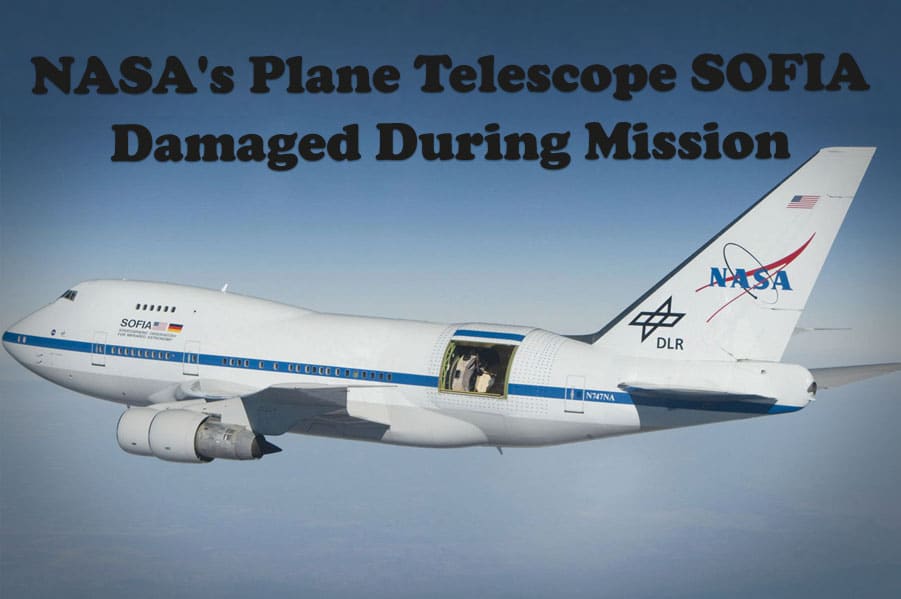Plane Carrying NASA’s New Telescope SOFIA Damaged During Flight!
Boeing 747 carrying NASA’s telescope was damaged during the mission in New Zealand. The event due to storm caused the telescope called SOFIA to make a forced landing. NASA announced that damage assessment studies are continuing.
The US National Aeronautics and Space Administration (NASA) used a telescope called SOFIA some time ago. This telescope was quite different from anything we’ve seen so far. Because SOFIA was a Boeing 747. NASA, which placed equipment to watch infrared rays coming towards Earth on this huge passenger plane, was studying the depths of the sky with the plane flying at 40,000 feet.
Loaded with NASA equipment, SOFIA was flying over New Zealand on its final mission. But, it has been announced that SOFIA has been downloaded recently and will not be able to be for a long time. This was because a storm on Monday, July 18, damaged the plane. In the statements made by NASA, it was stated that the damage assessment studies continue.
Won’t fly until the repair is complete
In the official statement, it was stated that the strong wind damaged both the front of the plane and the ladders placed on the fuselage of the plane. Fortunately, no crew was harmed during the time the telescope was in the air, which was used at a height of kilometers.
SOFIA was about to complete its mission
NASA designed SOFIA together with German scientists and has been using it for years. NASA officials, who took a decision according to the reports prepared last year, decided that SOFIA would not be used as of September 2022. The mission in the skies of New Zealand was one of the last missions of this giant telescope. But, the storm has disrupted the process. Authorities have not made any statement about whether the Boeing 747 will fly again after the repair.
NASA 747 SOFIA flight schedule
| Series ID | Instrument | Flight Date | Flights | Location |
|---|---|---|---|---|
| OC9A | FORECAST | Tue, Jul 6, 2021, to Thu, Jul 8, 2021 | 3 | Palmdale |
| OC9B | GREAT | Mon, Jul 12, 2021, to Tue, Jul 13, 2021 | 2 | Palmdale |
| OC9C | GREAT | Fri, Jul 23, 2021, to Fri, Aug 20, 2021 | 20 | French Polynesia |
| OC9D | HAWC+ | Wed, Aug 25, 2021, to Fri, Sep 10, 2021 | 11 | Palmdale |
| OC9E | HAWC+ | Thu, Oct 28, 2021, to Thu, Nov 4, 2021 | 6 | Palmdale |
| OC9F | GREAT | Mon, Nov 8, 2021, to Tue, Nov 23, 2021 | 10 | Palmdale |
| OC9G | EXES | Tue, Nov 30, 2021, to Fri, Dec 3, 2021 | 4 | Palmdale |
| OC9H | HAWC+ | Mon, Dec 6, 2021, to Wed, Dec 22, 2021 | 11 | Palmdale |
| OC9I | FIFI-LS | Tue, Dec 21, 2021, to Fri, Jan 21, 2022 | 13 | Palmdale |
| OC9J | FORECAST | Mon, Jan 24, 2022, to Fri, Feb 18, 2022 | 16 | Palmdale |
| OC9K | EXES | Tue, Feb 22, 2022, to Thu, Mar 10, 2022 | 12 | Palmdale |
| OC9L | FIFI-LS | Mon, Mar 14, 2022, to Tue, Mar 15, 2022 | 2 | Palmdale |
| OC9M | FIFI-LS | Sun, Mar 20, 2022, to Tue, Mar 29, 2022 | 8 | Santiago, Chile |
| OC9N | GREAT | Tue, Apr 5, 2022, to Thu, Apr 21, 2022 | 12 | Palmdale |
| OC9O | EXES | Mon, Apr 25, 2022, to Thu, May 5, 2022 | 8 | Palmdale |
| OC9P | FORECAST | Mon, May 9, 2022, to Thu, May 26, 2022 | 12 | Palmdale |
| OC9Q | HAWC+ | Tue, May 31, 2022, to Thu, Jun 9, 2022 | 8 | Palmdale |
| OC9R | HAWC+ | Tue, Jun 21, 2022, to Wed, Jul 6, 2022 | 12 | Christchurch |
| OC9S | GREAT | Sun, Jul 10, 2022, to Sun, Aug 7, 2022 | 20 | Christchurch |
| OC9T | FIFI-LS | Mon, Aug 29, 2022, to Thu, Sep 1, 2022 | 4 | Palmdale |
| OC9U | FORECAST | Tue, Sep 6, 2022, to Sat, Sep 17, 2022 | 8 | Palmdale |
| OC9V | HAWC+ | Wed, Sep 21, 2022, to Wed, Sep 28, 2022 | 6 | Palmdale |
Where is NASA SOFIA now?
Last September, NASA sent SOFIA to New Zealand for the last time, on a mission to perform final experiments. SOFIA is scheduled to stop operations in 2022.
What did NASA’s SOFIA recently do?
In the eight years since SOFIA began its Flights and observations, astronomers have studied the properties of the Moon, planets, stars, star-forming regions, and nearby galaxies.
As NASA 747 SOFIA continues to work, these observations have been made public, so that all researchers and enthusiasts can enjoy this information.
What has been detected with the SOFIA telescope?
SOFIA used electromagnetic field measurements to measure magnetic fields in galaxies, found water on the sunlit parts of the Moon, and confirmed that helium, the first type of ion to form in the Universe. That said, NASA spends about $85 million a year on the project.
What’s your Reaction?
+1
+1
+1
+1
+1
+1
+1

